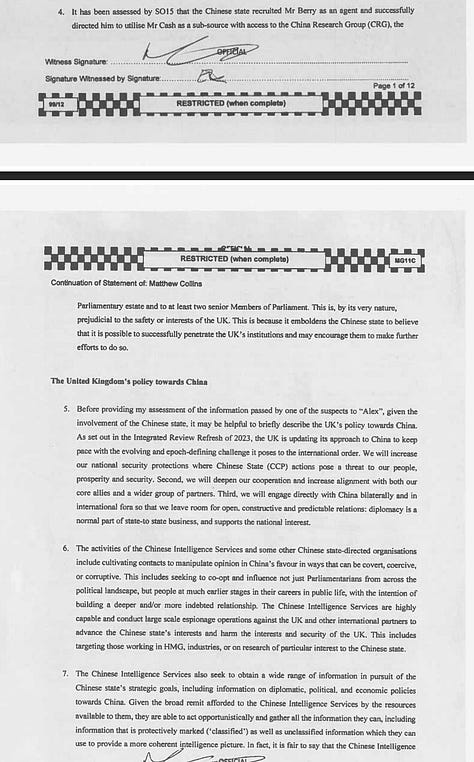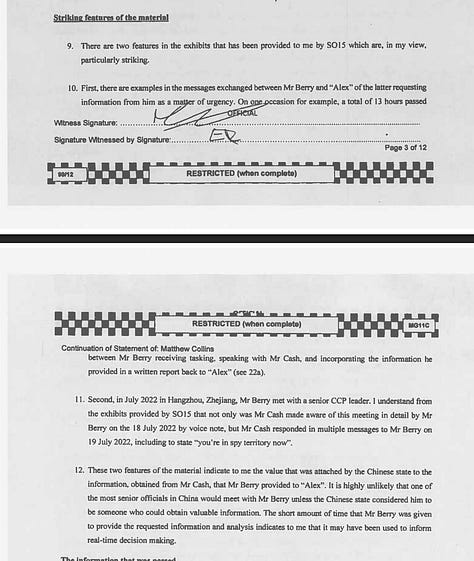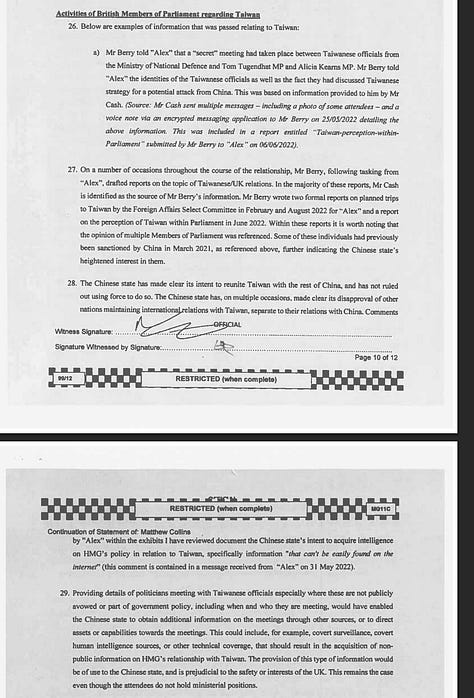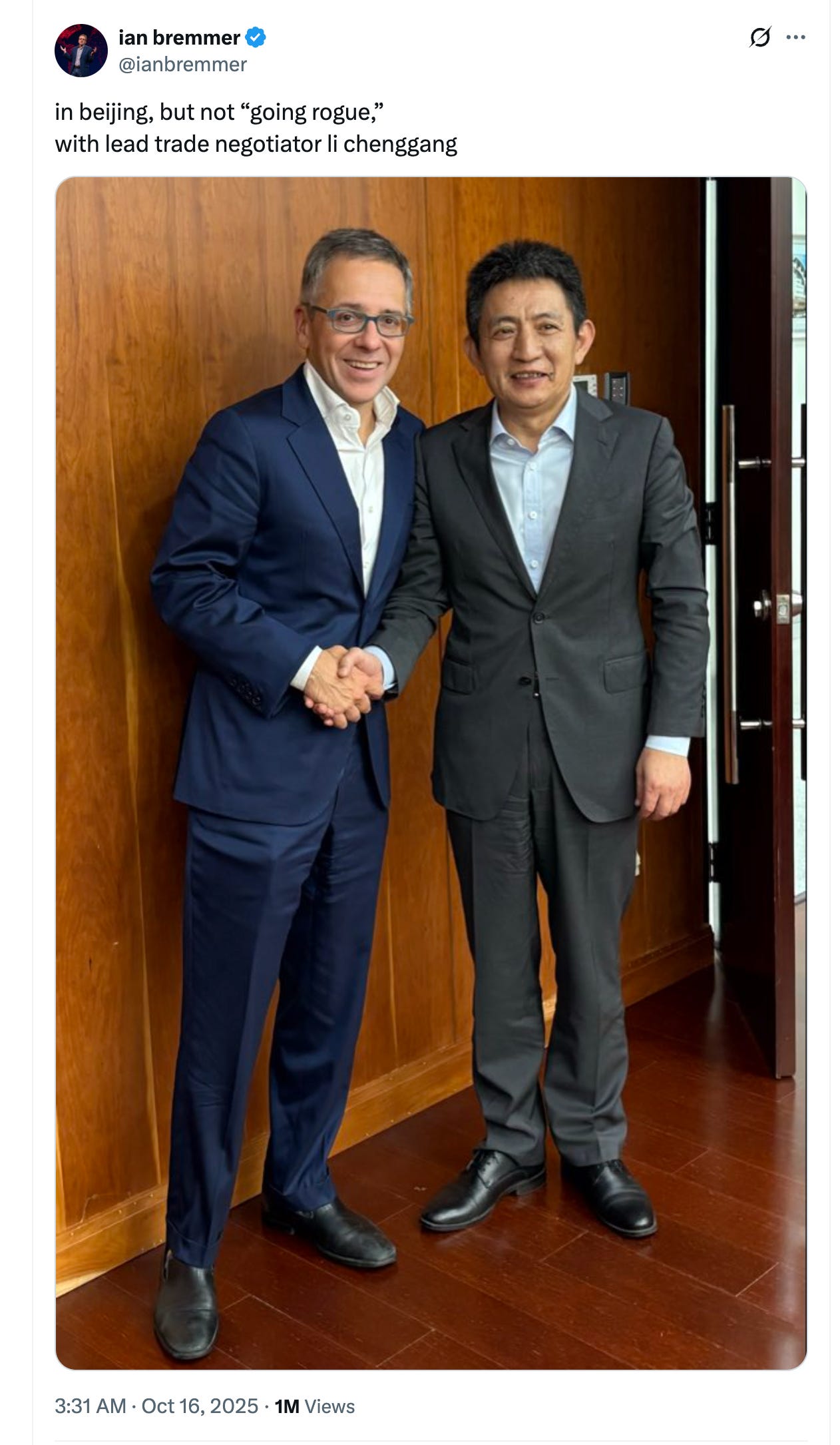US “seriously distorts and exaggerates China’s measures”?; Senior officials meet US executives; UK-China relations
Thanks everyone who tuned into my Sinocism Live conversation earlier today with CFR President Ambassador Mike Froman. The recording is now online and in the podcast feed. It was a timely conversation about US-China relations.
Summary of today’s top items:
1. US “seriously distorts and exaggerates China’s measures”? The Ministry of Commerce spokesperson He Yongqian took questions from reporters about the expanded rare earths export-control regime and recent US actions. She blamed the US for getting so many other countries worked up about the export control regime:
“The U.S. interpretation seriously distorts and exaggerates China’s measures, deliberately fueling unnecessary misunderstanding and panic,” He said. “In fact, U.S. extraterritorial jurisdiction has a long history and began decades ago. Since 2022, the United States has repeatedly introduced semiconductor export control measures targeting China, abusing globally applicable extraterritorial tools such as a 0% de minimis threshold and the Foreign Direct Product Rule, and coercing other countries to join in suppressing and containing China. The U.S. remarks are judging others by its own standards, which precisely shows the U.S. is continually overextending the concept of national security. The security and stability of global supply chains require the joint safeguarding of all countries, including the United States.”
I think the PRC side is feeling a bit of pressure from the reaction of other countries, not just from the US. But I still do not see how they will walk them back, or if they even would consider doing that, and even if they do “suspend” them, they have still created an expanded regime that can be switched on at any time.
He Yongqian also blamed the US for taking measures after Madrid that triggered this response, but notably does not say the US broke any “agreement”:
He Yongqian stated that after the China–U.S. Madrid economic and trade talks, the U.S. side, disregarding China’s repeated dissuasion, rolled out in just over 20 days a dense series of 20 measures to suppress China, seriously damaging China’s interests and undermining the atmosphere for bilateral economic and trade talks.
It does not sound like the US and China are making any progress in talking about talks, and given the Fourth Plenum starts Monday, unless something happens in the next three days, nothing will probably happen until October 23 at the earliest. Time is running out to do the advance preparations for a Trump-Xi meeting in just over two weeks.
2. Senior officials meet US executives - Vice Premier He Lifeng will talk to Apple CEO Tim Cook and other members of the advisory board of Tsinghua University’s School of Economics and Management, but he still does not seem willing talk to Treasury Secretary Bessent and USTR head Greer. Tim Cook also met with Minister of Commerce Wang Wentao, and Blackstone’s Stephen Schwarzman met with Wang Yi. I hope we find out what, if any messages, they are trying to send through these executives.
Ian Bremmer of Eurasia Group is also in Beijing and he posted a picture with Li Chenggang, MOFCOM’s top trade negotiator who has so irked the US side:
3. UK-China relations - The UK government released witness statements for the dropped China spy case from Deputy National Security Advisor Collins. The two formerly accused may have gotten off but they are going to be tarred for life by the revelations coming out in the media. It is still not clear why the case was abandoned, but the UK press smells scandal and is determined to find out, as Charlie Parton and I discussed in the Tuesday Sinocism Live. Senior UK government officials are lining up to visit China, even as this scandal spreads, the decision on the new PRC embassy is delayed again, and we are learning that “China routinely accessed low- and medium-level classification information on UK government servers over at least 10 years”. It will be fascinating/frustrating to watch is how the PRC side will spin the argument that the UK is actually at fault for any problems in the UK-China relationship and so it is up to the UK to “create the conditions” for improving the relationship. And I bet they will succeed…
From Collins’ witness statement:



4. Commentaries on stabilizing market expectations and tough battles and protracted war - The latest issue of Qiushi has an article by a Qiushi commentator calling for further stabilization of market expectations:
At present, affected by various complex factors, the problem of weak market expectations remains quite evident. For example, some business entities, hit by tariff and trade wars, lack the willingness to produce and invest; some lack confidence in their development prospects because they are unable to adapt to the requirements of high-quality development; and quite a number of people are reluctant or unwilling to consume due to factors such as income, social security, and the consumption environment. In addition, some fallacious domestic and foreign narratives have recently talked down China’s economic prospects, dampening, to varying degrees, producers’ enthusiasm for production and investment and consumers’ willingness to spend, thereby constraining the effectiveness of macro regulation and the economy’s upward momentum. Only when market participants’ expectations are steady and confidence is strong will economic activities such as consumption and investment become more active and the development trend remain positive. Faced with today’s profoundly complex and changing environment, doing good economic work requires close attention to the market expectations and social psychology behind consumption and investment behaviors, effective use of various policy resources, and more targeted measures to promote the steady improvement of social expectations, firm up confidence in development, and realize a virtuous cycle in which steady expectations and strong confidence reinforce economic stability.
Xinhua has been running a commentary series titled “How Xi Jinping Economic Thought Guides Economic Work in the New Era 习近平经济思想引领新时代经济工作述评. The third in the series is “坚决打好攻坚战持久战 Resolutely fight the tough battles and protracted war”. The piece mentions the tense US-China relations:
Since the beginning of this year, in the face of the U.S.-unilaterally provoked so-called “reciprocal tariff” storm, China responded swiftly with multiple moves, rolling out a “combination punch” of countermeasures across many fields to respond effectively. At the U.S. side’s request, the two countries’ economic and trade teams held talks successively in Geneva, London, Stockholm, and Madrid, facing differences head-on and engaging in equal dialogue, achieving a series of substantive results.
今年以来,面对美国单方面掀起的所谓“对等关税”风暴,中国迅速反击、多箭齐发,在多领域打出反制“组合拳”有效应对。应美方请求,中美双方经贸团队先后在日内瓦、伦敦、斯德哥尔摩、马德里举行会谈,直面分歧、平等对话,取得一系列实质性进展。
When it comes to talks, our door is open; if it comes to a fight, we’ll accompany to the end. By calmly responding to the United States’ successive provocations of trade and tariff wars, we have kept the initiative firmly in our hands, demonstrating our Party’s distinctive trait of daring and being adept at struggle.
谈,大门敞开;打,奉陪到底。沉着应对美国接连挑起的贸易战、关税战,主动权始终在我,彰显我们党敢于斗争、善于斗争的鲜明特质。
Can President Trump and the US fight a “protracted war”, as Xi believes he and the PRC can, and are? And who is more “adept at struggle”?

